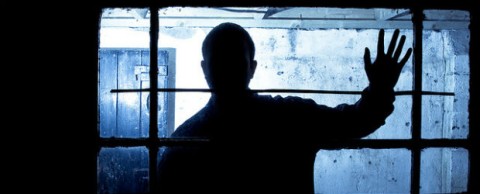New life without parole: Ministry behind bars
Every time I walk into a prison I notice the same things—the relentless noise, the yelling, the clanging of door after door. I’m led into an interior world resembling something like a human maze. When I was a seminary student in Columbia, South Carolina, I did my summer unit of clinical pastoral education in an ancient prison (now torn down) that included a bizarre subterranean section for the “criminally insane.” Never had I been in such a dark, otherworldly place.
I remember visiting my first inmate. Scholars have long been confused about that strange line in the creed saying Jesus “descended into hell”; I have it on good authority that he simply visited Columbia during a hot summer. I was assigned to building one. There was no air conditioning, and my pastoral flock consisted of 90 men and 90 cells located on the fourth and fifth tiers with only stairs for access. It was stifling and oppressive, and not only because of the heat. Prisoners watched as I made my way down the corridor; many had somehow been able to obtain small pieces of mirror that were skillfully angled so that they could see who was coming.
Read our latest issue or browse back issues.
“Don’t worry, chaplain,” said Josh, in the first cell. “We like ministers in here. If anything ever happened, the person who hurt you wouldn’t live through the night.” It was an oddly comforting statement and a profoundly formative summer. It turns out that a man I’ll call Jonah was in that prison at the same time I was, although we did not meet then.
For the past five years I’ve been visiting Jonah. We first met in the shadow of death row in the low country of South Carolina when an attorney asked my daughter Hannah, a law student with a focus in criminal defense, if she knew a pastor who would travel to Summerville to visit a client being harassed by fundamentalists. It seems that pastors were dropping by regularly to tell Jonah and others on the row that they were going to hell anyway, so why not get on with it instead of appealing a sentence and delaying a meeting with the One True Judge?
When I met Jonah I noticed two things: he was wracked with overwhelming guilt and very much wanted to die, and he knew the Bible. Jonah had been baptized in a Pentecostal congregation in a small rural South Carolina town. As we talked, it struck me that his knowledge of both testaments easily eclipsed the biblical facility of many Lutherans I know.
We talked for over an hour that day; we laughed at a few Bible stories, like the one about Elisha making an ax head float, and the one about old Eutychus falling asleep during a sermon and then falling three stories from an open window. But it was the prodigal son, and the story of the father who never gave up on that son, that opened the possibility for Jonah that perhaps God still loved him even though he’d committed a horrible crime.
Jonah’s home life as a child was bleak—physical abuse from a parent and regular sexual abuse from a cousin. He began to hallucinate as a teenager and went on and off a variety of medications. The night he committed a brutal murder, rape and robbery, Jonah was listening to voices that were unquestionably not his own. Blood samples easily linked Jonah to the crime scene, although to this day he has no memory of that night.
On the way home from death row that afternoon I thought of Will Campbell’s book Brother to a Dragonfly. Campbell, a white Baptist pastor active in the civil rights movement, decided to infiltrate a local meeting of the Ku Klux Klan. His rationale was that the oppressor needed the gospel of Christ every bit as much as the oppressed. Campbell’s friends in the movement were livid. Even though I’m sure that I would have shared their anger and feelings of betrayal, the image of the elder brother from the parable of the prodigal came quickly to mind. I was humbled by the realization that elder brothers were sometimes Christians—good people, including pastors, who wanted someone like the prodigal, or someone like Jonah, to pay with his life for what he’d done. Indeed, these “spokespersons for God” had already been assembling outside Jonah’s cell.
The friendship and trust between Jonah and me grew as the years and visits passed. We mailed letters back and forth, always writing about the Bible and what God might have in mind for Jonah in spite of his past. “I have you in my prayers,” he wrote. “Our Bible study from Acts is going well.” Over time Jonah moved from a persistent desire to die to a slowly emerging awareness that he, as a relatively older man, could make a difference for young men in prison.
His attorneys used the mitigating evidence from his past to propose that Jonah be moved off death row and into the general South Carolina prison population. We waited for a court date. Finally, a plea agreement meeting was scheduled for a small courtroom in the county where the crime had occurred over two decades earlier.
One of the first things I noticed in the courtroom that day was a quote from Micah 6:8 written on the wall: “And what does the Lord require of you? To act justly and to love mercy and to walk humbly with your God” (NIV). Although I wondered how much longer such a verse would be allowed in a court of law, even in the South, I was glad that the word mercy was there that day, surrounding Jonah with an old promise.
Jonah’s attorneys stood beside him in front of the judge as the horrible details of his crime were read. Jonah answered yes or no to a long series of pointed questions. His plea was to spend the rest of his life in prison with no hope of parole. He would die in jail.
The victim’s family also spoke, wearily and powerfully. They’d lived a nightmare for over 20 years, having been dragged into court time after time to rehash the details of the brutal slaying of a loved one. Their agreement to Jonah’s plea seemed filled with the spirit of resignation more than anything else; their invective seemed to be aimed more at the court system than at Jonah.
Many years ago I received a phone call from the wife of a close friend. My friend’s daughter had been found murdered—her body buried in a shallow grave—after a statewide search that lasted almost a month. My friend and I went for a hike in the mountains several weeks after the funeral and hardly spoke the whole day. At the end of the day my friend said something very softly. I thought I had misunderstood him. He repeated, “I’m going to have to visit my daughter’s murderer and offer my forgiveness some day. Not now but someday.” A few long years later, he drove to a prison in the lower part of the state and forgave the murderer. His account of the experience sounded like a story out of the Bible, chapter and verse.
That day with Jonah in the South Carolina courtroom felt very different. In this case, a broken, bitter family was agreeing to a plea that had taken Jonah five years to utter aloud. I prayed silently for all concerned, feeling their agony but certainly not sharing it. How could I begin to fathom what they’d been through? I knew only this: real reconciliation will occur only when the kingdom of God arrives in all its fullness. Heaven will house a very full table of penitents, all eating across the table from one another.
Just before we’d gone in to face the judge that day, I’d asked Jonah about his Bible study. “We’re still in Acts,” he said. “I love Acts. All those stories about jail. Last week we studied about the Ethiopian.”
“Yeah, great story,” I agreed.
We left the courthouse in a slow rain. Jonah, handcuffed, left with two deputies to spend the rest of his life in prison. I’m convinced that he has a calling from God to share the radical word with other incarcerated men—the word that Christ proclaims life even in the midst of death.
We’ll be in touch, two 55-year-old friends, as the months pass and we grow grayer together. I’ve learned a lot from Jonah, who had been swallowed by the dark underbelly of his past when I first met him and is now rising to life on a new shore even within walls of confinement. I’m still not sure who played the role of Philip and who was the Ethiopian when we climbed into the chariot and sat beside each other on a desert road five years ago, talking about God’s word together. I only know that we’re brothers in baptism (Acts 8:30–37) whose futures have found shape in a common call from a relentlessly loving God who gives up on no one.






